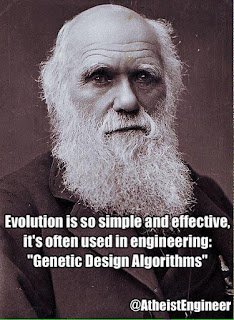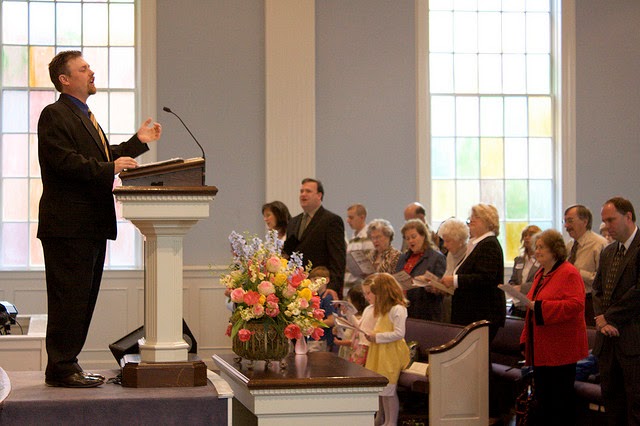Introduction
 |
| I hate to give away the punchline, but it's something like this. |
Here it goes...
If that's the test for existence, you're already tilting the playing field strongly in theist's favor. You've eliminated a huge array of potential gods and lowered the burden of proof to just "better explanation than no god". Imagine if we applied that same low threshold to a murder trial. "The defendant is guilty if it seems more likely that he did it than didn't do it."Existence of The God of the Bible
This is only an introduction to the main arguments for God’s existence. Obviously, much more can and has been written. First, the question of evidence for God’s existence is not a matter of some evidence being for God’s existence and some being against. It is whether or not the existence of God explains all of the evidence better than the alternative (that, is, that there is no Being higher than us).
Second, we say that one’s own understanding of the concept of God is one strong piece of evidence. This is something which most people have no problem understanding even though most people also have a natural tendency to want to reject God (as I once did and all of us actually do by nature). This tendency shows that belief in God is not a matter of wishful thinking.I accept that the concept of "God" exists. That doesn't mean that the actual thing envisioned in the concept exists. I have a concept of Zeus and Poseidon and Ra and Harry Potter. Yet no reasonable person would suggest that my "own understanding of the concept of Harry Potter is one strong piece of evidence" for Harry Potter existing, would you?! This tendency does not even remotely show that "belief in God is not a matter of wishful thinking." And I don't even follow the "logic" which would imply to the author that it does.
Third, there is the fact that you or anything else exists, since, as a contingent being, your existence must ultimately have come from some Necessary Being.Huh? Is this a feeble attempt at the first cause argument? There are a great many well known problems with it which are commonly taught in Freshman level philosophy.
Fourth, there is the amazing intricacy and capabilities of even simple forms of life. For example, a common house-fly is a far more advanced flying machine than anything we have been able to design. To say that the emergence of such life did not require design, but only mindless natural forces operating over a vast period of time violates the principle of Occam’s Razor, which says that, all things being equal, the simplest explanation is usually the correct one. The naturalistic explanation can only be surmised, never observed.False. Evolution is a well established, relatively simple scientific theory that has vast explanatory powers for complex life. It describes how complex organisms form over time by a process of random mutations and natural selection. The fact that the author thinks evolution is too complicated does not invalidate an entire field of modern science. Evolution is so simple and effective that it is even used in engineering (genetic design algorithms).
But we constantly observe how the application of intelligence on matter produces complex items. Indeed, in the absence of efforts guided by intelligent purpose, the natural tendency of matter is to go from order to disorder (as anyone who never cleans their house will easily recognize!).This is tap-dancing near the second law of thermodynamics, which even Answers in Genesis lists in its "arguments to avoid" section. Simply put, the tendency of matter towards disorder only applies to closed systems. Since the sun provides energy to the Earth, we are NOT in a closed system, and the second law of thermodynamics does not apply.
Fifth, the dominant belief today that the universe ultimately consists only of mindless matter/energy in time cannot explain the existence of us as people and any of our knowledge, experience or values (including all ethics).Why not? It's clear that consciousness is a gradient -- from the simple consciousness of a fruit fly to mice, dolphins, gorillas, and humans. Knowledge resides in our brains, as every neuroscientist will tell you. Our brains are made of "mindless matter/energy". Your computer has "mindless energy" too yet it can appear to think.
Sixth, ethics can only be arbitrary unless there is a Higher Standard. The only reason good and evil are not arbitrary is because goodness is God’s Nature as The Perfect Being. Anything which contradicts or opposes this is evil. (I would add that the only reason God can truly be self-sufficient as a Person is because He is relational within His ow/n Being as multi-Personal. This shows the superiority of Christian Monotheism.)This is such a mess.
- First, it's not an argument for the existence of a god, but simply an insult to your opponent: those of us who don't believe a god exists. It's the age old "where do you get your morals if not from god?" taunt.
- Second, it shows a juvenile view of right and wrong. "Anything against my god is evil". And I suppose you're going to tell us what you think your god wants. And Islam will tell us what their god wants. And they're not the same. And that's where holy wars come from.
To assert that an ultimate "Higher Standard" determines right from wrong sets aside nuances of specific situations and the limitations of an individual's knowledge / information which all bear on the "arbitrary" judgement of right from wrong. And of course, each individual's values determine how that person will select the best among multiple good things or the least bad among multiple bad things
Even if one were to claim that all of our experience as human beings is only an illusion, this still wouldn’t eliminate the fact that we still exist as real subjects of the illusion! And, taken to its logical conclusion, the anti-Theistic alternative absurdly posits an empty universe of objects with no knowing subjects. In other words, your existence as a human person disproves the Materialism/Empiricism of Atheism. For example, unless we existed as more than physical chemistry, a person looking at their own brain chemistry could only be described as chemistry somehow viewing itself! This is the “reductio ad absurdum” of Materialism (also known as Naturalism, which is supported by the equally-flawed epistemology of Empiricism).This seems to be a straw-man (solipsism isn't atheism) followed by who knows what "empty universe of objects with no knowing subjects" is supposed to mean. So no, my existence as a human person does NOT disprove Materialism, Empiricism, or Atheism. Note also that materialism and empiricism are not atheism. Each one is a unique concept. As an electrical engineer, I see no problem or issue whatsoever with your "chemistry viewing itself" attempt at "reducto ad absurdum". It works just fine and in no way challenges materialism, naturalism, or empiricism.
Downhill Slope
As you'll see, the last couple paragraphs of the blog entry are basically insults to non-believers and preaching. It's crash and burn for this guy.
All of these things point to the necessary existence of The Creator God described in the Bible. They are not necessary proofs in the respect that God’s existence needs to be established by proof. God is not a theorem. He is The Ultimate Fact. [snort] In fact, even logic itself is not explainable without the existence of The One True God (as the way His Mind works and the way ours is supposed to work because we have been made in His likeness). So, God must exist or else we couldn’t prove anything.You've posited without evidence that your god is responsible for these things, then turned around and made the absurd assertion that their existence is evidence of your god. This is the logical equivalent of: "Mermaids make seashells so seashells prove the existence of mermaids."
I'll just ignore the baseless claim that "God is not a theorem. He is The Ultimate Fact". I'm sure you believe that's true, but your belief doesn't make it true.
Finally, you've wound yourself around the axle of logic with a Sye Ten Bruggencate style "you're not allowed to have logic unless you accept my god" argument. Next, you'll be saying "I don't do Bible study with atheists." It's patently absurd to everyone but believers who blindly accept your initial premise: that god is responsible for logic. You've not established that to be true, merely claimed it without the slightest shred of justification.
Thus, all of these “proofs” are not really proofs, [FINALLY, something I can agree with. Oops. I should finish the sentence … ] but “evidence after The Fact” of something which is above all proof: God’s inescapable existence. [awwwwwww. It started out so good] But most people “can’t handle the truth!” that God exists because they want to be the god of their own lives [Insult your opponent time?]. The Bible calls this our “sinful nature”, by which we are naturally-inclined to reject God. [Who cares what the Bible says, you haven't proven god exists yet!!] This is despite the most direct piece of evidence of all: the fact that all of us inevitably and inescapably know The One True God in our hearts, but suppress this knowledge. [LMAO]Calling this last bit a "fact" doesn't make it an actual fact. Rather, it's just a claim from your particular holy book and doctrine. As an atheist, I can say with confidence that it's wrong, and so is Paul when he says anyone who leaves Christianity wasn't a Christian to begin with.
Nevertheless, the author has gone off the rails from what started as a rational explanation for god's existence. He is now just spewing his personal dogma. Well, let's see what's next.
Many reading this will undoubtedly deny that you already know God exists, just as you will likely resist where all of the above evidence points. But that is simply you acting according to the basic characteristic of mankind, as the Bible alone explains it: because you were born as a member of a rebellious race of sinners. Only God can change this, but all of us are culpable for not seeking Him and asking Him to open our hearts, eyes and minds so that we can get to know Him and so that we can be saved and transformed. The Gospel found in the Bible explains this and has led millions to The Greatest Blessing possible: the peace and joy of knowing that I have been forgiven of my sins and that my Creator loves me with perfect love.That's silly. The author's argument is bad because the author's argument is bad. Trying to lay the blame for your bad argument at your reader's feet is just further embarrassing yourself. Your Bible was written millennia ago by anonymous authors you believe to be "divinely inspired" for no other reason than the church told you that's what it is. I reject that claim until adequate evidence is provided too.
Blah blah blah preaching.
I hope and pray that you will truly consider all of this and find the same Blessing which I found 32 years ago.You've wasted 32 years of your life praying to a god which doesn't exist. I hope you can escape this fallacious thinking some day, but I don't hold out much hope. You seem to be in pretty deep.




